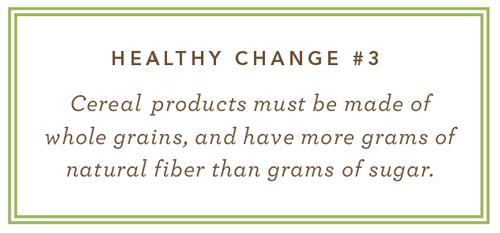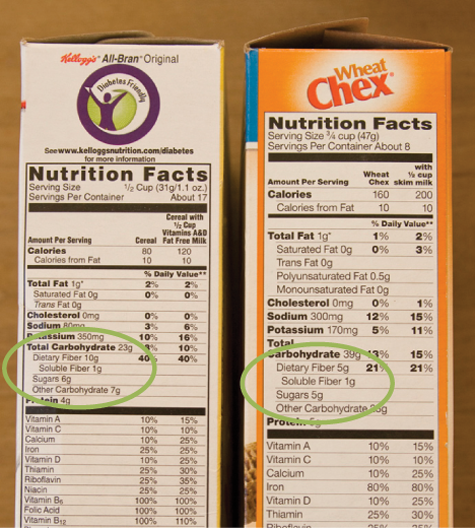In “The Whole Darn Grain” I promised to visit the local grocery store and list the package cereals that met our Healthy Change #3:

This rule is a simple device for selecting healthy breakfast cereals. It works for processed foods as well. Some, for example, have noticed that their “whole wheat” bread has more added sugar than fiber. (Stay tuned; in a later post we’ll look at healthy breads.)
If you're wondering where to find the sugar and fiber amounts on your cereal at home, see the nutrition facts on the side of the cereal box. Under "Total Carbohydrates" it lists the fiber and the sugar (see the area circled in green below).

The logic behind this Healthy Change follows the daily dictums of three whole-grain servings and limited sugar consumption (6 tsp. max for women, 9 tsp. max for men, per the AHA). Plus you get all the other benefits of whole grains, including fiber. When little sugar is pre-added, the cereal can be sweetened and upgraded by adding fresh fruit in the home.
Here are the 8 cereals that met our rule and 5 that were close, out of the 128 package cereals inspected in a local store (Ralph’s, the cereal section was 60 feet long!). The first number is the grams of fiber, the second is the grams of sugar:
Nature’s Path Flax plus Multibran, 5/4
Weetabix Whole Grain Biscuit, 4/2
Kashi Go Lean Original, 10/6 (Soy is 1st ingredient listed.)
Kashi Heart to Heart, 5/5
Post Grape Nuts, 7/5
General Mills Kix, 3/3
Post Shredded Wheat (spoon size), 6/0
Ralph’s Shredded Wheat (spoon size), 7/<1
Kellogg’s All Bran, 10/6
Ralph’s Bran Flakes, 5/5
General Mills Cheerios, 3/1
Ralph’s Toasted Oats, 3/1
General Mills Wheat Chex, 5/5
For the typical family concerned about health and value, hot cereals cooked at home from bulk whole grains are the best choice. You can buy grains for a dollar or less per pound versus paying three to five dollars a pound for the less-healthy packaged cereals. Keep a package or two of the store-bought cereals for occasional variety or when you’re unusually rushed.
If you have a favorite healthy package cereal not on this list, please comment. It may not have been in the store we checked.